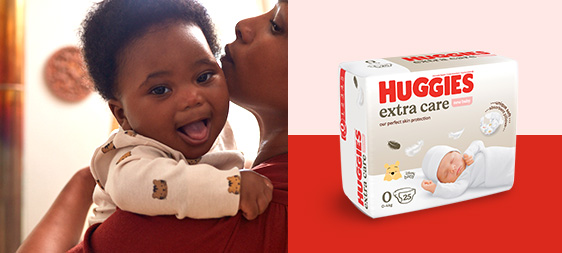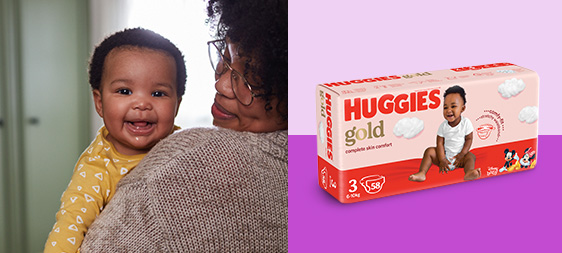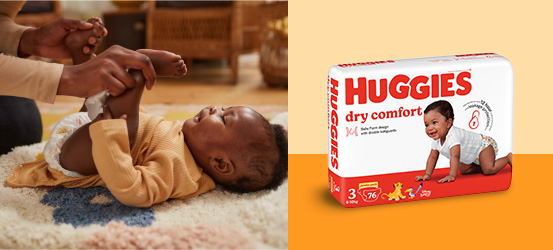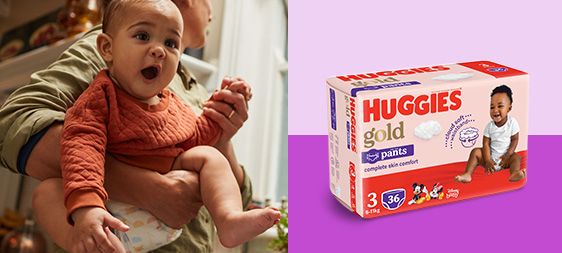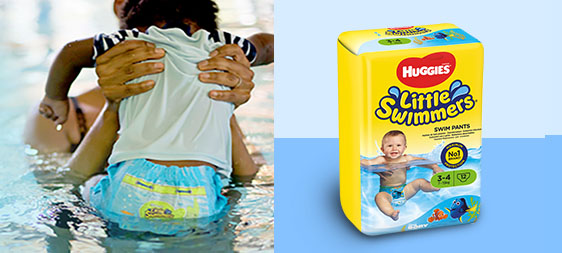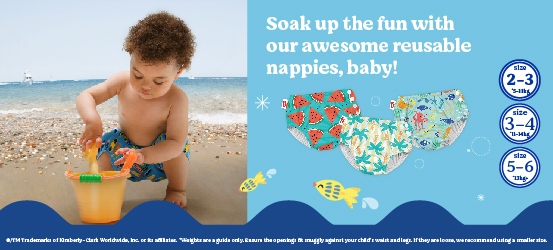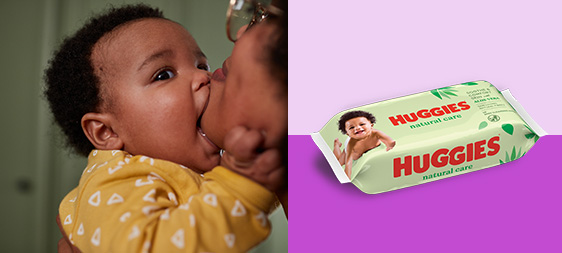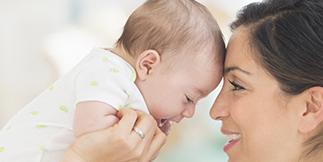Expect lots of chatter and talk from your toddler this month as they learn to expand on their range of vocal sounds and say a few simple words. Of course, their language won’t be clear just yet; they’ll still be talking in jumbled up words and sentences – as much to themselves as anyone in particular. They are likely to become shy though when faced with strangers and new situations. It will be at home, when they feel most comfortable and relaxed, that they will frequently practice their new verbal skills.
But this won’t be the case with their physical development. This month it will become even harder to keep your toddler in one place. They will be off in a second and drawn to investigate whatever captures their attention. This means you’re going to have to watch them constantly and keep close tabs on them, especially when you’re out.
Your toddler is unlikely to want to sit for too long and will want to get up and run whenever they can. Make a point of strapping them in and having some healthy snacks on hand to distract and occupy them if necessary. Remember that your toddler needs to take at least 2 steps for every one you do; their legs are still very short and need to work extra hard to keep up. They’ll tire easily and will still want to be carried at times. If you use a back pack you’ll notice they will be getting heavier and your own tolerance for carrying them long distances is reduced.
Growth and development
This is the age of exploration and discovery, imagination and wonder. The simplest things will fascinate your 17-month-old; whether it is water flowing from a tap or an ants nest. They will have learnt how to point with their forefinger and you’ll see their facial expression reflecting the intrigue that they’re feeling. The word “no” will come easily at this age and they will be learning quickly how to register their protest. Expect some opposition to your requests this month, especially when you need to disengage them from an activity. Stiffening in your arms, throwing back their head and squealing in protest are all common forms of oppositional behaviour. This can come as a surprise to some parents who until now, may not have seen any indication that their child actually has a will of their own.
Your toddler could be getting a little big for their cot now, but it’s still a little early for them to move into a bed. Make sure they can still move freely and aren’t restricted by the cot sides. If the top (horizontal) rail is at their chest height or lower then they will need to start sleeping in a bed. Avoid using lots of bulky bed linen and pillows in their cot at this age. Adventurous toddlers can use these to form a step and hoist themselves up and over the upper cot rail. Scan your toddler’s room for unprotected power points, unsealed toiletries, blind cords and potentially harmful substances. Your toddler’s brain is still too immature to work out what is safe and what isn’t. Although they may seem unusually bright and clever, they are still incapable of reason and linking risk with harm.
Play and interaction
Make sure you have lots of stackable containers, pouring vessels and toys of similar shapes and colours to play with. Matching pairs and objects of a similar appearance starts at this early age. Don’t worry if your toddler gets frustrated when their blocks come cascading down and try not to be too quick to help them. It is through practice and repetition that they will learn how to be patient and build on their skills of making things work in a different way.
What you can expect this month
Lots of dressing and undressing this month, especially if your toddler is a girl. They are likely to be just as comfortable walking around naked as wearing a pair of your shoes and a tea towel on their head. Their imagination rules, so you’ll see them interpreting objects as being all manner of different things. But 17 months is also the age of linking routines and behaviour so you will see your toddler “helping” you in the house and copying your habits. This is a funny stage and you’ll see yourself replicated in miniature.
Sometimes your toddler’s behaviour may cause you to become upset or frustrated. Their behaviour could quickly alternate between being delightful to being very difficult. Sometimes it will become necessary for you to just to take a very deep breath and walk away for a few moments. They are still too little to reason with or for you to provide long explanations. It is your actions which will mean the most to your toddler. When combined with affection, clear direction and consistency your toddler will be in the best environment to positively shape their behaviour.
ry to remember your toddler will not be deliberately setting out to be difficult. Their brain is still developing and is being shaped and moulded by their experiences. Children who grow up in households where their parents commonly show aggression, chaos or anger, learn that these are normal emotions. If you feel as if your own childhood experiences are having an impact on how you care for your toddler, speak with a counsellor. Repeating the patterns of abuse from one family to the next can only be stopped by acknowledging there are problems and then doing something constructive about them.
Food and nutrition
Food needs to be a simple process now, with your toddler eating much the same food as the rest of the family. Avoid cooking different meals for them in the hope that they’ll eat more. Hungry toddlers tend to eat when they are ready, which means you need to think about how often your toddler is having in-between meal snacks.
They may want to eat more or less at each meal, may favour some foods over others and take a liking or rejection to some foods. Much like adults, toddlers can change their minds about what they are willing to try or flatly refuse. Sometimes they may want to be more adventurous and at least have a taste of new foods and other times they may only eat the same foods for days on end.
Avoid giving your toddler juice, cordial, tea or fluids other than milk and water at this age. Their teeth are so vulnerable to decay that any substance which contains sugar, including some fluids, will increase their risk of dental caries. Snacking on foods can also increase the likelihood of “acid attacks” on their tooth enamel and increase the chances of dental decay.
If your toddler is still having bottles, stop them this month. Expect some emotional fragility as they adjust to not having them. Be sure you are doing your toddler a favour by stopping their bottles altogether. They may like to suck from a straw cup, use a sipper or spout cup or beaker or alternately, a normal plastic cup with a soft rim to drink from.
Keeping your toddler healthy
Try not to limit your toddler’s exposure to other children now. Children are not born social and only learn the skills of relating to others from exposure and role modelling. Although you may want to insulate your toddler against other children’s germs, this is itself not a healthy practice. Your toddler’s immune system is designed to cope with a range of potentially harmful bacteria and viruses and needs to be primed to work effectively. Of course, it makes sense to keep them away from people who are unwell with infectious diseases, but this is not always possible.
Simple maintenance measures will help your toddler to stay well. Daily bathing, frequent nappy changes, hand washing, immunisations, tooth brushing and limiting their exposure to sick people will all help.
It may not always be obvious when your toddler is becoming unwell themselves. It is common for children in this age group to become quiet, lose their interest in eating and even have some subtle changes in their behaviour. Often when they are in the early incubation stages of an illness and before any symptoms emerge, they can be particularly clingy.
If you sense that your toddler may be coming down with an illness, plan for a few quiet days at home. This is often the time when illnesses are at their most contagious so limiting their exposure to others is sensible.
General tips
Close doors to those rooms of your house which you’d prefer your toddler doesn’t access.
This simplifies family life and will reduce your stress levels by not having to constantly monitor where they are.
Get some nursery rhyme CDs and play them at home and in the car.
Singing and reciting rhymes can be a great way to defuse a building tantrum and helps enormously with language development.
If your toddler won’t keep still for you to cut their fingernails or toenails, do this when they are asleep.
Your toddler will be using both of their hands equally now and it won’t be clear which will be their dominant hand.
Closer to their pre-school years it will be clearer if they are going to be right or left handed.
Don’t worry if your toddler looks bow-legged just now.
This is part of the normal evolution of leg development and it can take a few years before a child’s legs take on their permanent appearance.







